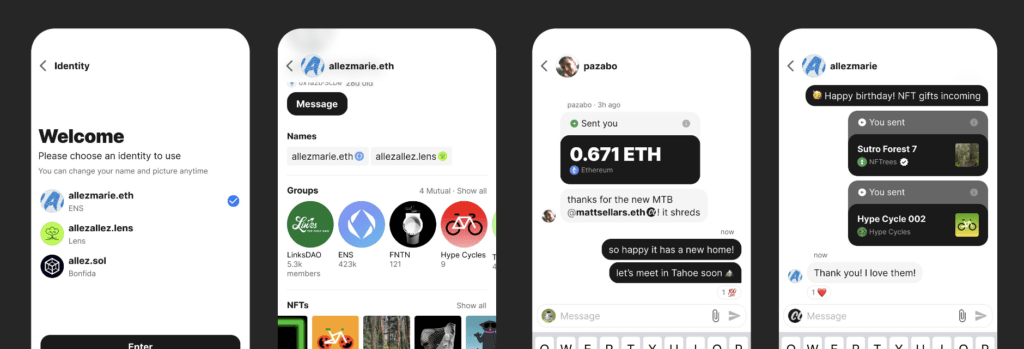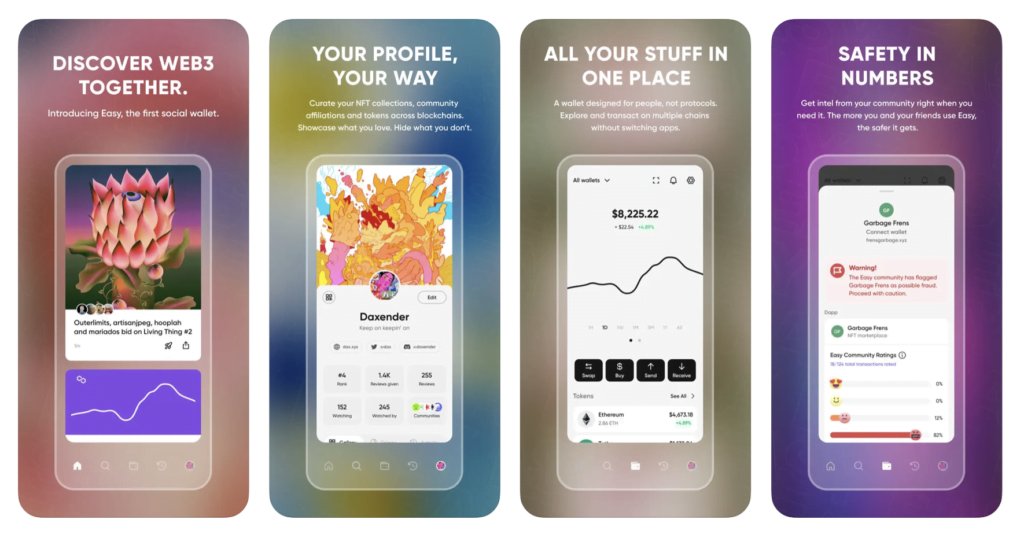For Web3 to achieve mass adoption, practical applications are necessary at the user layer. Social wallets are working towards customer-friendly layers by combining two essential components of Web3: communication and digital asset management.
Web3 social wallets are decentralized applications where activities like group chatting, direct messaging, performing transactions, and collective investing in crypto assets can all happen within the same place.
Several social wallets have gained traction and funding recently.
- Tribes secured a $3.3M pre-seed funding in a round led by South Park Commons, Kindred Ventures, and Script Capital.
- Easy raised $14.2M in a round that included Lobby Capital, Relay Ventures, 6th Man Ventures, Tapestry VC, Upside, and Scribble Ventures.
- Zerion received $12M from Wintermute Ventures, Mosaic, Coinbase Ventures, Alchemy, and Placeholder.
Today we’re thrilled to announce our Series B fundraise led by our friends at @wintermute_t as we work to build the best wallet for Web3 citizens ! https://t.co/kQz21t0F4m
— Zerion (@zerion) October 12, 2022
Web3 wallets focus on different aspects of being social
There are things that all three wallets have in common, like letting users connect with the same usernames across different platforms. Social wallets accomplish this by integrating with decentralized protocols and other dApps in the Web3 ecosystem, like ENS and Unstoppable Domains, which offer NFT domains and usernames. Another common theme is facilitating Web3 search by providing various tools.
Nevertheless, each comes with its own strengths.
Tribes: create chat groups and co-own digital assets
In the landscape of Web3, people mostly communicate through external platforms like Discord, Twitter, and Telegram. The new wave of social wallets enables communication directly inside digital wallets. So, they function as messengers.
Using Tribes, it’s possible to create a group chat where each member can access a mutual wallet. As a result, members can co-own assets and manage them collectively. For instance, they can buy and send tokens, invest together in NFTs, and incorporate decision-making processes into the chat. Group members can propose transactions, discuss an issue until they decide on the proposal, and vote directly in the chat when they are ready.

Since the wallet is shared in group chats, multi-signature smart contracts are necessary to obligate the signatures of multiple people’s signatures to approve a transaction so that fraud is prevented. For this purpose, Tribes integrates with Safe.
It’s also integrated with multiple Web3 ID solutions. For example, integration with ENS lets users sign in with their usernames. It also works seamlessly with the Lens protocol and Unstoppable Domains. Furthermore, Tribes works for assets and wallets built on Solana, allowing people to use their .SOL usernames.
Easy: navigate Web3 more securely
The social wallet Easy has recently launched its beta product on the App store. Its focus is on discovering Web3 together as a community. The signal feature allows Easy users to rate dApps, and flag suspicious ones to warn other members. This community rating system enables safer Web3 navigation.

Users can also follow other accounts and curate engaging social profiles by building and showcasing NFT collections. The profile feed summarizes verified blockchain activity to keep you in the loop with what’s happening in Web3. The native multichain search engine allows users to discover new tokens, collections, and influencers.
Zerion: follow intriguing crypto wallets with the social search feature
Zerion is a multichain wallet that works on more than 10 networks. At the time of writing, it has over 200K active monthly users.
Zerion allows exploring social tokens – tokens that are built around the reputation of an individual or a brand. Creators mint social tokens to create token-gated experiences for their communities.
For example, only holders with a minimum threshold of governance tokens can participate in decision-making or access exclusive Discord channels for discussions. Some social tokens integrated with Zerion are Whale, Friends with Benefits, and Mork.
One of the highlights of Zerion is the search box that allows you to explore any crypto wallet. As the wallet is integrated with over 500 protocols, including ENS domain names, you can simply input a username like vitalik.eth into the search box and explore the assets stored in the wallet associated with that username.
Similarly, it’s possible to search and follow Lens profiles, enhancing the social aspect of the wallet, as Lens is an important player in the decentralized social ecosystem. Users can benefit from the search feature to follow the wallets of whales and get notifications on their transactions and new NFT mints.
Author

Nagi An is a content writer who is passionate about NFTs, web3, DAOs, and DeFi. She's covers a variety of topics about NFT fundamentals.




